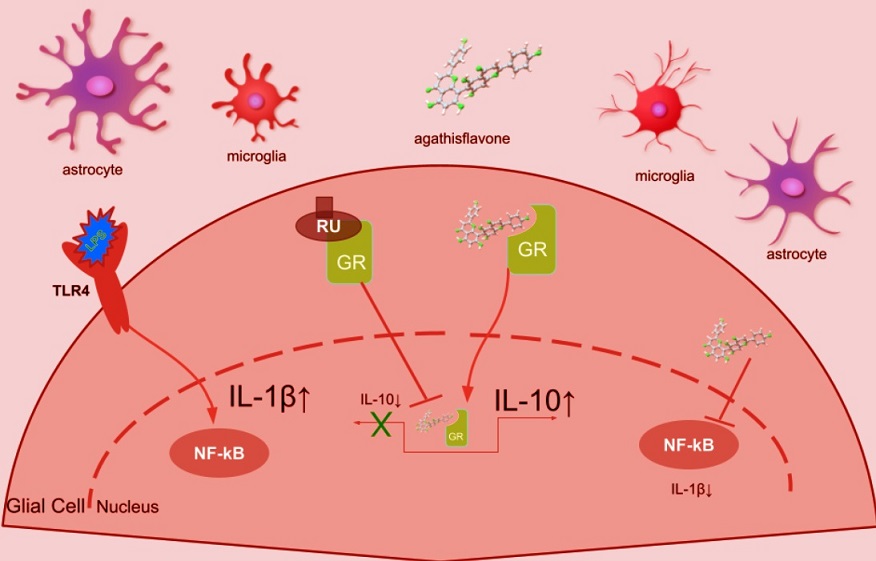Agathisflavone Regulates Brain Cell Inflammation Through Glucocorticoid Receptors
Nikhil Prasad Fact checked by:Thailand Medical News Team Feb 24, 2025 1 month, 3 weeks, 1 day, 11 hours, 30 minutes ago
Medical News: A Natural Compound with Potential to Reduce Brain Inflammation
A recent study has uncovered new evidence that agathisflavone, a plant-derived compound, may play a crucial role in controlling inflammation in brain cells. Researchers from the Federal University of Bahia in Brazil, along with collaborators from other institutions, explored how this natural biflavonoid affects microglia and astrocytes - two types of brain cells that become highly active in response to injury and disease.
 Graphical Abstract: Agathisflavone Regulates Brain Cell Inflammation Through Glucocorticoid Receptors
Graphical Abstract: Agathisflavone Regulates Brain Cell Inflammation Through Glucocorticoid Receptors
Brain inflammation is a key factor in many neurodegenerative disorders, including Alzheimer's and Parkinson's disease. While inflammation is a necessary response to protect the brain, excessive activation of microglia and astrocytes can lead to long-term damage. This
Medical News report highlights how the study examined the ability of agathisflavone to regulate this inflammation through its interaction with the glucocorticoid receptor, a key regulator of immune response.
How the Study Was Conducted
The research team cultivated microglia and astrocytes from newborn Wistar rats and exposed these cells to lipopolysaccharide (LPS), a substance known to trigger inflammation. Some cultures were then treated with agathisflavone, while others were also given mifepristone, a glucocorticoid receptor (GR) antagonist, to determine whether agathisflavone's effects were mediated by GR activity.
The scientists examined various markers of inflammation, cell morphology, and gene expression using advanced molecular biology techniques. They specifically analyzed the impact of agathisflavone on microglial reactivity and astrocyte activation, focusing on key inflammatory markers like CD68, GFAP, IL-1β, and IL-10.
Key Findings on Microglia and Astrocytes
The results revealed that agathisflavone significantly reduced the inflammatory activity of microglia and astrocytes. Specifically:
-Microglia treated with agathisflavone exhibited a reduction in inflammatory markers and showed an increase in branching, which is associated with a less reactive, more homeostatic state.
-The expression of CD68, a marker for activated microglia, was significantly lowered in the presence of agathisflavone, indicating reduced microglial activation.
-In astrocytes, agathisflavone reduced the expression of glial fibrillary acidic protein (GFAP), which is a key indicator of astrocytic inflammation.
-The compound decreased the expression of pro-inflammatory cytokine IL-1β while boosting the expression of IL-10, an anti-inflammatory cytokine that helps control excessive immune responses.
-When cells were pre-treated with mifepristone, many of agathisflavone's effects were reversed, suggesting that the compound's ability to regulate inflammation depends largely on glucocorti
coid receptor activation.
Molecular Docking Confirms Strong Interaction
The study also used computational modeling to investigate how agathisflavone interacts with the glucocorticoid receptor at a molecular level. Results showed that agathisflavone binds to the receptor with a higher affinity than dexamethasone (a commonly used synthetic steroid) and mifepristone. This suggests that the compound can effectively modulate the receptor’s activity, influencing inflammatory responses in the brain.
Potential Implications for Neurological Health
The ability of agathisflavone to reduce inflammation via glucocorticoid receptors opens new possibilities for its use as a therapeutic compound.
Neuroinflammation is a hallmark of many brain diseases, and current treatments often come with side effects. Since agathisflavone is a natural product, it may offer a safer alternative to traditional anti-inflammatory drugs.
This study’s findings suggest that agathisflavone could be developed as a potential treatment for neuroinflammatory and neurodegenerative diseases.
Future research is needed to confirm its effects in animal models and, eventually, in human trials. If successful, this natural compound could provide a promising new approach for managing inflammation-related brain disorders.
The study findings were published in the peer-reviewed journal: Molecules.
https://www.mdpi.com/1420-3049/30/5/1014
For the latest on Brain Inflammation, keep on logging to Thailand
Medical News.
Read Also:
https://www.thailandmedical.news/news/how-brain-inflammation-affects-glutamate-and-dopamine-in-schizophrenia
https://www.thailandmedical.news/news/monkeypox-virus-and-the-growing-threat-of-brain-inflammation
https://www.thailandmedical.news/news/minocycline-helps-reduce-staphylococcus-aureus-induced-brain-inflammation-and-anxiety
https://www.thailandmedical.news/pages/thailand_doctors_listings
